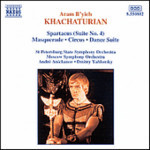
Spartacus (Suite No. 4) / Masquerade / Circus / Dance Suite
 $25.00
Out of Stock
$25.00
Out of Stock6+ weeks add to cart
KHACHATURIAN
Spartacus (Suite No. 4) / Masquerade / Circus / Dance Suite
St Petersburg State Symphony Orchestra / Moscow Symphony Orchestra / Andre Anichanov / Dmitry Yablonsky
[ NAXOS / CD ]
Release Date: Saturday 27 October 2007
This item is currently out of stock. It may take 6 or more weeks to obtain from when you place your order as this is a specialist product.
"At the price it is easy to recommend"
- Fanfare
The Armenian composer Aram Khachaturian was born in Tbilisi in 1903 and had his musical training at the Gnesin Music Academy in Moscow, entering in 1929 the Moscow Conservatory, where he was a pupil of Prokofiev's friend and mentor, Myaskovsky. He established himself as a composer during the 1930s and held official positions in the Union of Soviet Composers, although he was included in the condemnation of formalism, together with Shostakovich and Prokofiev, in 1948. Nevertheless his style of composition, with the use of regional elements from Armenia and elsewhere in the southern areas of the Soviet Union, in the end ensured his continuing reputation, enhanced once more, after the death of Stalin in 1953, by his ballet Spartacus, a work that combined spectacle in its crowd scenes and attention to individual virtuosity in its solos, with a plot that could not but satisfy the ideals of the regime. Writing in a tonal idiom with richly coloured orchestration, Khachaturian was opposed to modern experiment in composition and in spite of the condemnation of 1948 held publicly that Soviet composers enjoyed a creative freedom impossible in the West, with its modernising fashions, to which subservience was obligatory. During his life-time he received many honours, including in 1954 the title People's Artist. He died in 1978.
The ballet Spartacus, the score of which was completed in 1954, deals with the slave rebellion led by the hero of that name against Roman domination. The historical Spartacus himself was Thracian by birth, a shepherd who became a robber. He was taken prisoner and sold to a trainer of gladiators in Capua, but in 73 BC he escaped, with other prisoners, and led a rebellion during the course of which he defeated the Roman armies and caused devastation throughout Italy. He was eventually defeated by Crassus, a general well known for his wealth, and put to death by crucifixion, together with his followers. It should be added that to Karl Marx Spartacus was the first great proletarian hero, a champion of the people, while the ultimate fate of Crassus, killed in 53 BC during the course of a campaign that had taken him to Armenia, might have had a particular significance for Khachaturian.
Tracks:
Spartacus: Suite No. 4
Masquerade
Circus
Dance Suite
